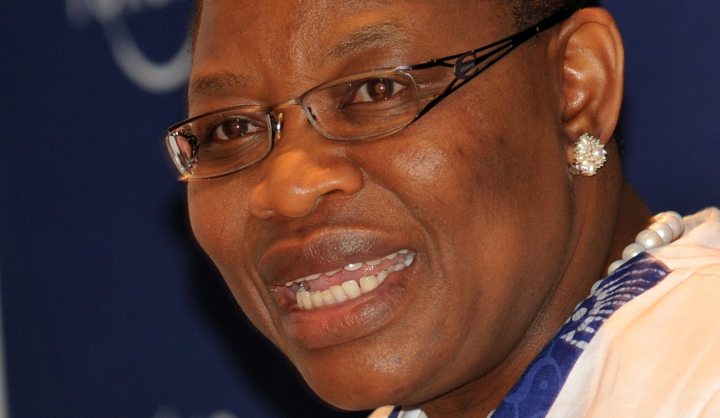Africa
#BringBackOurGirls founder: ‘Two years is a long time for children in the den of terrorists’

On the second anniversary of the kidnapping of the 276 Chibok girls by Boko Haram in Nigeria, SIMON ALLISON speaks to the co-founder of the #BringBackOurGirls movement which did so much to raise attention to their plight.
This time two years ago, Oby Ezekwesili was outraged: 276 teenage girls had just been kidnapped from their high school in Chibok, a village in north-eastern Nigeria, and no one seemed to care. No one even knew about it.
So Ezekwesili decided to act. As a former government minister, and a top official at the World Bank, she had the connections and the influence to make something happen. Along with three other women she set up a pressure group to force Nigeria into action. They decided to call it Bring Back Our Girls, and they had no idea it would become a global social media sensation.
Michele Obama picked up on the #BringBackOurGirls hashtag. So did British model and actress Cara Delevingne and dozens of other celebrities. From absolute obscurity, the Chibok girls were suddenly world-famous — not that anyone could tell them, because no one knew where they were.
Two years later, they still don’t. Some of the girls have escaped, but most are still unaccounted for (reports as to there fate and whereabouts are unconfirmed and conflicting). And Ezekwesili is still outraged. Daily Maverick spoke to her by telephone, from her Abuja office, the day before the two-year anniversary of the Chibok girls’ disappearance.
“For us, ensuring that our own Chibok girls are not forgotten but are given justice, that is still the priority,” she said.
She’s clear on what needs to happen next. “Governments from all around the world [need to get involved]. The US, the UK, Canada, Australia, Israel, China and France had all offered support during the early days after the abduction, they should come back and connect all their intelligence assets, with the Nigerian government in the lead. They should figure out exactly where the Chibok girls are, whether they are together or scattered in blocks.
“Then the second thing is to use that information as the basis for making a good decision as to what would be the lowest risk option to get them back. There is none that would not come with a risk, so it would take experts in the fields of rescues to decide.”
Although the campaign has faced criticism from some quarters – some say the movement distracts from the wider conflict against Boko Haram, while others debate the wisdom of “hashtag diplomacy” – Ezekwesili is confident that Bring Back Our Girls has made a real difference.
“Our Chibok girls have been a symbol for all other citizens that were kidnapped but were nameless. By pressing our government to rescue them, they ended up rescuing 3,000 others. That is a good thing,” she said.
It helps that the Nigerian military seem to be taking the Boko Haram issue far more seriously than they did before. “We have been very vocal in commending the fact that our military is definitely better than what we had a year ago. The most undignified sight for us as a movement was when we were attempting to get our government to bring back our girls and what we would see on the evening news was our military running away from Boko Haram. We actually broke down seeing that. Today the story is different. The military is stronger, it has degraded the capabilities of Boko Haram, that’s brilliant, it has been able to retrieve territories, that is excellent,” said Ezekwesili.
She is less positive about the government’s efforts to deal with the widespread humanitarian disaster that has accompanied the conflict with Boko Haram in north-eastern Nigeria.
“We have a monumental-scale humanitarian tragedy and so the rebuilding the communities and villages for people to return, that’s going to be a long process. We do not think we are doing well with that at all.”
She’s realistic, however, about the government’s resources, and thinks the solution lies in persuading donors and major powers that what’s happening in Nigeria deserves the same kind of attention being given to Syria or Afghanistan.
Despite – or because of – the lack of progress, Ezekwesili is determined to keep the pressure on the new Nigerian administration led by Muhammadu Buhari.
“Our own president has in his inauguration speech said that he will not claim to have defeated Boko Haram without the rescue of the Chibok girls and other victims… Therefore we must hold the president to that pledge. Two years is a long time for children who want to be educated to instead find themselves in the den of terrorists.” DM
Photo: Obiageli Katryn Ezekwesili, Vice-President, Africa Region, World Bank, Washington DC in Access to Energy held During the World Economic Forum on Africa 2009 in Cape Town, South Africa, June 12, 2009. Photo by World Economic Forum.


















 Become an Insider
Become an Insider